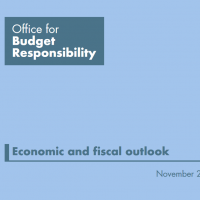
The Building Societies Association (BSA) added its voice to the concerns surrounding the policy while academics from the London School of Economics have already suggested that targeting it at older people would be more appropriate.
In its economic outlook, the OBR explained that by putting Stamp Duty Land Tax (SDLT) savings towards deposits, first-time buyers would be able to buy properties they would not have been able to afford, but more expensively.
And it expected a distortion of house prices around the boundaries of the benefit.
The cut announced by chancellor Philip Hammond will be for all stamp duty for first-time buyers for properties up to £300,000. It will also apply to the first £300,000 for properties worth up to £500,000 purchased by first-time buyers.
Double impact
The OBR, which independently assesses the national economic performance for the government and analysis the effect of its Budget policies, suggested the effect would be double the previous stamp duty holiday as it can be continuously passed-on.
It believes the reduction in stamp duty costs will feed through “relatively quickly” and noted that “since the relief frees up FTBs’ savings to put towards higher deposits, these higher prices can be paid”.
“Thus, the main gainers from the policy are people who already own property, not the FTBs themselves,” it said.
“For some potential FTBs with smaller deposits, who are constrained by loan-to-value lending criteria, the relief will enable them to borrow a multiple of their SDLT saving, allowing them to buy properties that they otherwise could not afford – but more expensively.”
The OBR also highlighted two other behavioural effects on the public finances.
“First, the relief will distort the housing market at prices around £500,000. This will reduce receipts as FTB transactions bunch below the threshold,” it said.
“Second, it is likely that some FTB purchases will displace purchasers who would have paid more SDLT on the equivalent purchase.”
BSA questions effectiveness
In its response to the announcement, the BSA said the chancellor was on the right track but warned that the behavioural response of sellers could scupper the advantage if they simply increased the price of the property.
Building Societies Association chief economist Andrew Gall said: “Our data shows stamp duty is a much bigger barrier for home movers than first-time buyers. There was nothing specific in the Budget for them or indeed for older borrowers looking to downsize.
“Some are constrained by the lack of suitable homes. A lack of housing supply remains the single most important market issue we face.”
He added: “Many of the proposals to boost the supply of housing will take a few years to get going and some are only at the consultation stage, but the allocation of up to £44bn for housing infrastructure is a critical precursor to larger scale development.
“The commitment to explore housing guarantees with a figure of £8bn mentioned was useful and could help smaller developers. We will contribute to this early stage work as it gets going.”
Market reaction
Elsewhere, reaction to the policy was more mixed from the mortgage and housing industry.
UK Finance chief executive Stephen Jones said: “Removing stamp duty for all first-time buyers up to £300,000 will help ensure the UK has a housing market which can meet the aspirations of that important group and contribute to the health of the wider economy.”
Spicerhaart Corporate Sales managing director Mark Pilling was similarly positive about the move saying: “The chancellor’s decision to scrap stamp duty completely for first time buyers on properties up to £300,000 is great news; it will increase activity all the way up the chain and create a much more buoyant housing market.”
However, this was questioned by Mortgage Advice Bureau head of lending Brian Murphy.
He said: “In an Autumn windfall, first-time buyers just benefitted from a very welcome boost to their deposit savings, courtesy of chancellor Hammond.
“While this is great news for those taking their first steps on the ladder, and doubtless will inject a bit of impetus into a plateauing market, in the short term this could actually have the effect of creating a demand for properties that fall within the exempted values which may further stymie buyers at entry level.
He added that “although today’s move may enable first-time buyers to purchase a home more quickly, they still need the stock available to buy in the first place.”
For all Mortgage Solutions’ Budget coverage on the first-time buyer stamp duty exemption and the boost for small business click on the links.
The government has also launched a fintech competition to make rent history count toward mortgage affordability, changes to rental benefits and the Chancellor’s speech in full.
An extension of Council Tax liabilities for unoccupied homes was announced and Mortgage Solutions has dug out a series of hidden measures and rounded-up the best of the coverage.















